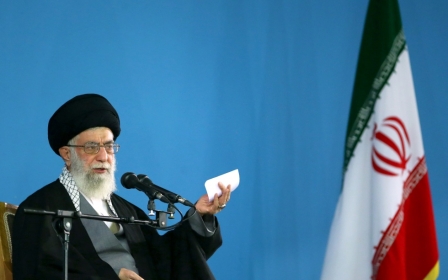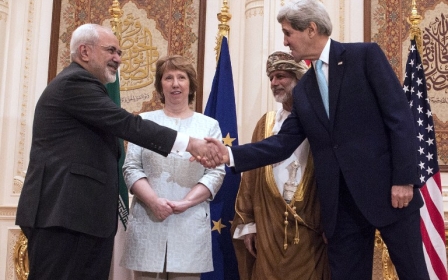Obama vows to veto new sanctions bid against Iran

US President Barack Obama warned Congress on Tuesday that any move to impose new sanctions on Iran could scupper delicate negotiations aimed at reaching a complex nuclear deal.
"New sanctions passed by this Congress, at this moment in time, will all but guarantee that diplomacy fails ," Obama said in his State of the Union address to the Republican-controlled Congress.
And, as some lawmakers maneuver to try to draft a bill slapping new sanctions on Iran, Obama renewed his vow to veto any such legislation.
Talks between global powers and Iran to rein in its disputed nuclear program resumed last weekend in Geneva, with a new deadline looming at the end of June.
Negotiators however have said they would like to see a framework deal in place sometime in March, after two previous deadlines for a historic accord were missed.
"Between now and this spring, we have a chance to negotiate a comprehensive agreement that prevents a nuclear-armed Iran," Obama told US lawmakers.
Such a deal would also secure "America and our allies — including Israel, while avoiding yet another Middle East conflict."
The US president warned "there are no guarantees that negotiations will succeed" and vowed to "keep all options on the table to prevent a nuclear Iran."
But he warned new sanctions would "alienate" the United States from its allies and ensure that "Iran starts up its nuclear program again."
"It doesn't make sense. That is why I will veto any new sanctions bill that threatens to undo this progress," Obama said, referring to an interim accord under which Tehran has frozen its uranium enrichment in return for limited sanctions relief.
"The American people expect us to only go to war as a last resort, and I intend to stay true to that wisdom," he added.
Russia signs military cooperation deal with Iran
Meanwhile, Russian Defence Minister Sergei Shoigu signed a military cooperation deal with Iran on Tuesday that his Iranian counterpart touted as a joint response to US "interference".
Shoigu is the most senior Russian military official to visit Tehran since 2002, according to Iranian media, and the agreement comes with both countries facing Western sanctions.
The deal provides for joint exercises and military training, as well as "cooperation in peacekeeping, maintaining regional and international security and stability, and fighting against separatism and extremism," the Iranian defence ministry website said.
Defence Minister Hossein Dehqan told state television that Iran and Russia had a "shared analysis of US global strategy, its interference in regional and international affairs and the need to cooperate in the struggle against the interference of foreign forces in the region."
Russia has long been Iran's principal foreign arms supplier but their ties took a major hit in 2010 when Moscow cancelled a contract to deliver advanced S-300 ground to air missiles, citing UN sanctions imposed over Tehran's nuclear programme.
Iran demanded $4 billion in compensation for the cancellation of the $800 million order.
"The two countries have also decided to settle the S-300s problem," the Iranian defence ministry said on Tuesday without elaborating.
As Russia has been hit by Western sanctions over its involvement in the conflict in Ukraine, it has stepped up its economic ties with Iran in the past year.
The two governments are also both allies of Syrian President Bashar al-Assad in his nearly four-year-old conflict with rebels and pro-Arab Spring dissdents.
Spain hopes Iran will join coalition against IS
Meanwhile, Spain said Tuesday it hopes Iran will join the global fight against extremism if Tehran reaches an agreement with world powers over its disputed nuclear programme.
"Iran is critically important in the region," Foreign Minister Jose Manuel Garcia-Margallo said on the sidelines of a business forum in Madrid.
"I hope that if a solution is found for the Iranian nuclear issue, Iran could join the fight" against a phenomenon "which threatens all Muslims, be they Shiite or Sunni," he added.
"Iran exercises enormous influence in the Shiite world and has ties with movements that operate in the region."
"Against Islamic State or against its competitor in horror, Al-Qaeda and its diverse branches, there are no other solutions but the military solution," Garcia-Margallo said.
Spain, which has one of the rotating seats on the UN Security Council, will send 300 soldiers to Iraq at the end of January to help train the country's soldiers to fight Islamic State.
The soldiers will be part of the US-led coalition fighting the group and they will train Iraqi troops in explosives handling, land mine clearance and special operations.
The Spanish foreign minister is scheduled to attend meeting in London on Thursday of nations taking part in the coalition against the group, hosted by US Secretary of State John Kerry and British Foreign Secretary Philip Hammond.
Stay informed with MEE's newsletters
Sign up to get the latest alerts, insights and analysis, starting with Turkey Unpacked
Middle East Eye delivers independent and unrivalled coverage and analysis of the Middle East, North Africa and beyond. To learn more about republishing this content and the associated fees, please fill out this form. More about MEE can be found here.




